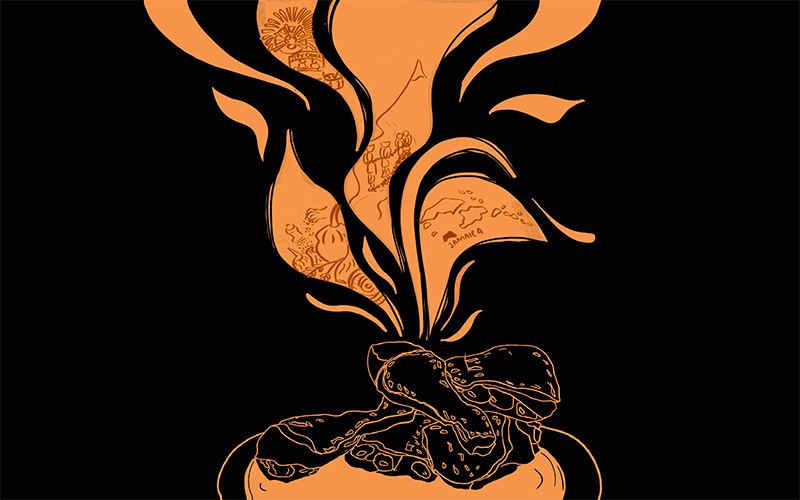Words by Riaz Phillips
Illustration by Natasha Phang-Lee
History
Notting Hill Carnival
The politics of jerk chicken

Words by Riaz Phillips
Illustration by Natasha Phang-Lee
The endless crowds let out a collective roar as their buses and trains approach Notting Hill Carnival. Amid the towering residential blocks, revellers come in search of rhythmic sounds, from steel drum calypso to slow-stepping reggae. After traversing dense crowds for hours, inevitably hunger sets in, drawing revellers to the Caribbean food stalls staffed like army barracks at the ready. Curried goat, oxtail, patties, Trinidadian roti and Guyanese pepperpot adorn the menus. But at Carnival there is only one headliner: jerk chicken.
Compared to other migrant foods, relatively little is known about Caribbean food in the UK. Jerk chicken is no exception, yet its uncharted history goes back centuries. When marauders ‘discovered’ the Caribbean islands in 1492, it unleashed an era of colonisation, war and terror. Island natives became slaves, soon joined by slaves from Africa, and though most were doomed to a life of servitude, legends were made out of those who rebelled and escaped. One such person was Nanny of the Maroons, who has come to embody the fabled group of escapees on the island of Jamaica.
Far inland, up in the heavily forested Blue Mountains, Maroons mingled with tribes such as the Taínos and Arawaks who shared survival and sustenance techniques that included ‘jerking’. Wild meats were coated in local herbs, pimento (allspice) and scotch bonnets, with a hint of sugar to tame the fiery flavours, and left to marinate for hours or days. The meat was then placed in dug-out pits and concealed by rows of dense pimento logs while it slowly cooked. This measured operation minimised smoke, which could be seen for miles by rival tribes, soldiers and incoming ships.
Counter to this life of stealth, Europeans continued living an opulent life on the islands. Colonists and slave owners carried over their traditions of religious fêtes, which turned into local carnivals. Slaves were forbidden from taking part but would stage their own small carnivals in private dwellings, harking back to traditional African rites while parodying their owners’ festivities. After emancipation, the freed people transformed these events into celebrations steeped in a fusion of native and African lore.
Centuries later, faced with winters of discontent and an unfriendly populace, the disillusioned Caribbean diaspora of post-war Britain turned to home comforts: music, dance and of course, food. Carnivals popped up across the country and acted as a means of catharsis, while displaying Caribbean culture to the masses.
Notting Hill Carnival has become the ultimate occasion for freedom of expression, but the paradox that jerk chicken, a meal born out of secrecy, has become its champion cannot be lost. For many the event is nothing more than a street party, but the dancing and feasting will be forever politically and historically charged.





